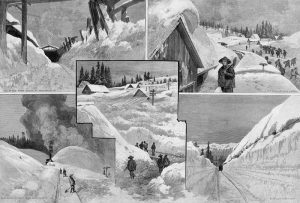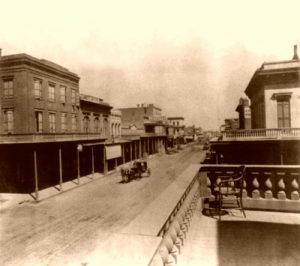By William Daugherty in 1891
During a snow blockade on the Union Pacific Railroad some years ago, a once well known Nevadan was caught by it, returning from New York to San Francisco and detained for some days at a station in Wyoming.
He was one of Nevada’s early residents, a comrade of Mark Twain’s, and noted for his good nature and waggish disposition. He had married some years before the event related, and his wife was a most estimable lady to whom he was devotedly attached. Two children blessed their union, and if ever a parent was proud of his offspring, that man was our hero, Bob H—-. He had one of the cherubs photographed naked in a seashell. From it, he had a large oil painting made that ornamented his parlor and which he always drew his visitors’ attention to with more pride than any curio in his cabinet of rare collections.
But, with all his love for home, and its gods and idols, he was always and everywhere gallant and attentive towards the gentler sex, and had not his wife possessed an amiable disposition, Bob’s home would not have been so attractive for him. When he was caught in the blockade referred to, the passengers were not left in a bad plight by any means, for they had a dining car well provisioned and an ample supply of coal, and during the week they were imprisoned, they made merry and took much enjoyment out of the situation. A mail was dispatched daily over the obstructing drifts by a carrier on snowshoes, and so all who wished could communicate with their friends.
Bob was first to avail himself of such opportunity and made much ado over writing a letter daily to “his best girl,” and as none of the passengers knew that he was married, they concluded he was a most devoted lover. His wife received the letters and was cheered into sweet content by their tone, for in them, Bob bemoaned the fate that kept him from his family and declared that the only source of content with his surroundings was the companionship of a sweet little girl named May, who of all the passengers on the train reminded him most of his darlings at home.
Sweet little May was a perfect treasure. She sat and talked with him by the evening lamps of his pretty home in California; she ate at the same table with him, played snowball and wooled his ears, and when the chance offered a good opportunity, poured a handful of snow down his back. But, Bob added, he couldn’t take any offense at anything she did, for she was just too sweet for anything. Daily, the letters reached his wife, and she concluded the little child must be a treasure, and in her amiable way, she felt pleased to know that Bob had the companionship to while the dreary hours away. Finally, a telegram to her from Bob announced the blockade raised and that he would arrive on the third day following.
His wife had grown a little anxious, and desiring to meet him as early as possible, went up to Sacramento on the day set to see how the snow-bound passengers looked after their long detention. She arrived first, and when Bob’s train rolled into the depot, white with snow from the Sierras, she was waiting and looking. She saw Bob step off the platform, and with a little exclamation of pleasure, she hastened toward him. He did not see her, as he turned to assist a lady from the train, and was so occupied in his attentions that he did not see his wife until she threw her arms around his neck and with a joyful laugh said: “Bob, don’t you know me?” Of course, he was surprised but not abashed, but the lady, who was young and pretty, was looking with some amusement and a look of inquiry at the newcomer. Bob faced the music like a man and introduced them thus: “Little May, this is my best girl.” Then, his wife realized why he had been so contented while blockaded in the snow. They became the best of friends, and his wife often told the story.
By William Daugherty, for the Reno Evening Gazette, August 15, 1891. Compiled and edited by Kathy Weiser/Legends of America, updated January 2021.
About the Author: Written by William Daugherty wrote for the Reno Evening Gazette in 1891. The Gazette was first published on October 12, 1876, and continued for the next 107 years. In 1977, it was merged with the Nevada State Journal and continues to exist today as the Reno Gazette-Journal.
Note: The article is not verbatim as spelling errors, minor grammatical changes, and editing have occurred for the ease of the modern reader.
Also See:
Pioneers on the Nevada Frontier (Reno Evening Gazette)
Tales of the Overland Stage (Reno Evening Gazette)
Nevada Mining Tales (Reno Evening Gazette)


